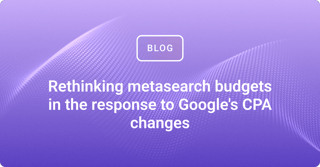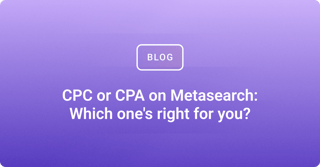As an official Google partner, Triptease recently attended the 2023 Google Travel Partner Summit - Berlin and these are the takeaways from Google’s keynote speech to travel tech partners.
The focus was all about consumer behaviour and the need to evolve with the times. It seems that people are shifting their priorities when it comes to travel, and hotels need to adapt accordingly.
So, what will get consumers excited about packing their bags and going?
Customers are prioritising travel and loyalty is up for grabs
Firstly, customers are prioritising travel in terms of discretionary spending and new experiences. The next generation of travellers are investing more time and effort in planning, researching, booking and dreaming - providing new touch points for brands which are more important than ever. Consumers want their trips to be specifically designed and curated to their needs and desires.
Furthermore, loyalty is up for grabs, especially among a group of younger audiences who are interested in trying new things. This presents a great opportunity for brands to lean into these conditions and make a new, good first impressions which will last a lifetime.
Inspiring customers with dynamic, rich content
However, it's important to note that inspiring content is essential in winning over travellers. It's not enough to simply put regular content out there and expect results. People are looking for videos, rich imagery, and information about what it will be like to experience a certain place.
The most relevant platforms for this type of content are dynamic and highly visual. This is why Google is working to create visually immersive stories that inspire trip planning. These stories combine the best of inspiration and utility, making them the perfect tool for travellers who want to explore new places.
Highlighting environmental impact to help customer make informed decisions
Consumer trends are changing, and Google is evolving to meet the needs of the next generation of travellers. This includes understanding carbon emissions and making that information available to travellers when booking. Carbon emissions are now listed on Google, helping travellers to understand the environmental impact of their choices and make more informed decisions.
AI and the new era of technology
The travel industry is entering a new era of technology. We've already seen the first two major shifts with the invention of the internet and the rise of mobile devices. Now, artificial intelligence is opening up new opportunities for travel tech partners to create more personalised and innovative experiences for travellers.
Overall, it's clear that travel tech partners need to lean into technology and adapt to changing consumer behaviours in order to succeed in the industry. By focusing on data driven decisions, dynamic platforms, and a seamless travel experience, companies can win over the next generation of travellers and build lasting loyalty.
The hoteliers view: how Travel Tech can help suppliers be successful
Google also held a panel on ‘The hoteliers view: how Travel Tech can help suppliers be successful’. Below we’ve summarised the key questions asked, with answers from a panel of hoteliers at the event.
What does direct mean for hoteliers?
Sebastian Wagner, Director E-Commerce from NH Hotel Group.
For hoteliers direct is crucially important and by cutting out the middle man hoteliers have the opportunity to increase margins and foster loyalty and guest retention. Of course, Hoteliers acknowledge they have distribution partners and value their business from markets they cannot penetrate, however they would like to take back control of the market we can access (the minimum).
Tobias Warnecke, Managing Director from the German Hotel Association.
Whilst a lot of people searched for, and booked hotels direct during Covid-19, now it’s time to embrace a new normal. The share of online of distribution channels have been rising over the last few years. For most hotels, 50% of all bookings are now online and 50% offline. Their direct bookings come primarily through telephone and email whilst their indirect are driven by heavily OTAs. And so the challenge for hoteliers now is how to convert offline into direct online channels for hotels.
Céline Mamane, Senior Manager Digital Marketing from MEININGER Hotels
When there are new hotels added to the portfolio every year guest segmentation becomes more important than ever and has a significant impact on the share on direct and indirect. It’s true that over the pandemic direct increased - and hotels want to further extend that, shifting most of it to online. This means increasing media spend, optimising the website and booking engine performance.
As a tech platform how can we use our solutions to help?
Tobias Warnecke, Managing Director from the German Hotel Association.
Free Booking Links are a good tool for hotels to have the opportunity to appear in the search engine results. How to set up, enable and deal with these aspects is the struggle that many hoteliers face and Google should provide solutions to educate on what is possible for direct bookings.
At Triptease we give hotels access to Google’s extensive audiences and make sure that hoteliers are equipped with a connection to Google in order to run Metasearch free booking links and drive direct bookings.
Sebastian Wagner, Director E-Commerce from NH Hotel Group.
We have different sets of properties and so ADR is a key metric for us. We try to achieve a healthy level of occupancy and aim for high ADR so essentially the highest revenue possible for the inventory we have.
We depend on departments to get their segmentation right to ensure we have rooms to sell, to monitor the price ensuring it is correct. These are all factors needed to optimise in online campaigns for efficiency and we have a max CPA cost that we are willing to spend.
We have a picture of how much money we put in and where we get it out however Google can play a part in helping with optimisation. The truth is, business customers are bound to a specific channel i.e. from their HR and so they don’t use Google as they are required to book in this channel so this is a struggle.
How do you optimise for direct booking and maximise the value your get through results?
Konstantinos (Santikos Collection)
We optimise both offline and online through focusing on perks and loyalty and participating in multiple online channels. It is often difficult to present an offer in a line for the user journey so targeting specific users is key.
Using the Triptease Messages product, you can personalise your website for every guest with customisable message formats and intelligent behavioural triggers so that you are presenting the right offer to the right customer at the right time in their journey.
Celine (Meininger Hotels)
Google’s bid optimisers are great when acquiring new customers as we can focus on the multiple touch points we have with the guest during the search and exploration phases of their journey and so using segmentation is vital since we have very different types of guests. For example, we use travel dates to personalise the user experience and optimise the booking engine conversion rate.
We know that customers expect personalisation as standard and with Google phasing out cookies, capturing first-party data is now critical for hotels. With Triptease you can easily capture rich customer data on your website and send it straight to your CRM automatically.
How do you align your tech stack for this?
Sebastian (NH Hotel)
We have our set up which is quite robust and because of this we are nervous to transfer everything especially in a cookieless world.
Celine (Meininger Hotels)
Our primary goal is to make sure that providers can speak with one another since we have many providers. Admittedly, it is easier to have a unified tech stack across the industry and I’m sure I speak for everyone when I say that ideally we don’t want to be dealing with tech more than we have to.
How can Triptease help?
There are options to tackle this problem but none are perfect. Doing it yourself or using an agency takes too long and is unreliable, plus agencies have even less understanding of your data than your team does. Stitching together a bunch of point solutions like an Ad platform and your booking engine’s built in tools is painful and doesn’t hold together well.
The end result will still give you no clear view of your customers. In a perfect world you would have all the data about the path to purchase together in one system: Demand data, guest behavioural data and pricing and performance data. You’d also have the tools to activate that data across all your marketing channels in a really synchronised, joined up way.
We call that system the Triptease Data Marketing Platform. It captures data, understands data and activates data for hotels. We can make marketing dollars go further by adjusting bidding based on whether you have the best price for that particular guest, and whether they are a good fit for your hotel. We can coordinate communication across on-site messaging and your CRM to reduce cart abandonment, we can even change your prices so that you’re never undercut on metasearch.
This personalisation works across a range of channels beyond just your website - including retargeting, metasearch, paid search and email.
The Triptease Data Marketing Platform provides the data sophistication of an OTA for every hotel. Request a demo to find out more.
Ready to find how?
Find out what the Triptease Data Marketing Platform’s functionality could do for your hotel’s marketing strategy and revenue. Fill out the form below and a member of our team will be in touch with the answer!


![[Webinar] Google kills CPA: How hotels can still win on metasearch](https://www.triptease.com/hs-fs/hubfs/Resources%20-%20feature%20images/Feature-Image_%5B%5BWebinar%5D%20Google%20kills%20CPA_%20How%20hotels%20can%20still%20win%20on%20metasearch%5D.png?width=320&height=320&name=Feature-Image_%5B%5BWebinar%5D%20Google%20kills%20CPA_%20How%20hotels%20can%20still%20win%20on%20metasearch%5D.png)


![[Video] What is commission bidding (CPA) and why is Google removing it?](https://www.triptease.com/hs-fs/hubfs/Resources%20-%20feature%20images/Feature-Image_%5B%5BVideo%5D%20What%20is%20commission%20bidding%20%28CPA%29%20and%20why%20is%20Google%20removing%20it_%5D.png?width=320&height=320&name=Feature-Image_%5B%5BVideo%5D%20What%20is%20commission%20bidding%20%28CPA%29%20and%20why%20is%20Google%20removing%20it_%5D.png)


